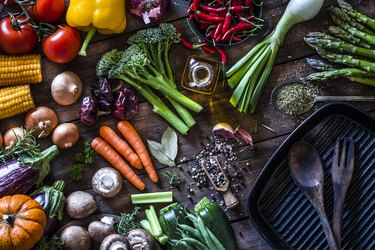
Imagine being able to plop down with your favorite salad, gobble up as much as you want and effortlessly lose weight. Sadly, it's not that simple. Although there are foods you can eat a lot of and lose weight, including vegetables, other factors matter, too.
Tip
Enjoying a lot of vegetables can help you lose weight because they're packed with fiber and low in calories. However, if you're dipping your veggies in dressing, sautéing them in butter or embellishing them with sour cream, you might not get the weight-loss results you're seeking.
Video of the Day
Factors That Determine Weight Loss
What you eat isn't the only factor influencing weight loss. Your age, gender, body size and level of physical activity dictate how many calories you need each day, which is directly related to weight loss, according to Harvard T. Chan School of Public Health. What works for one person, might not work for another, so be sure to focus on the big picture, and not just what's on your plate.
Video of the Day
Eating as many vegetables as you want to lose weight will get you off to a great start, though. Vegetables are good sources of both fiber and water, both of which take up space in your stomach and help you feel full and satiated. The more carrots, yams and broccoli you enjoy, the less likely you'll desire that post-dinner hot fudge sundae or frosted cupcake.
Use Healthy Condiments
How you prepare your vegetables can make a big impact on how much weight you lose. For example, potatoes contain more fiber than a bowl of oatmeal and more potassium than a banana. However, the traditional toppings such as sour cream and butter pack a punch when it comes to excess fat and calories. Instead, dress up your potato with black beans, fresh herbs or a spoonful of salsa.
If you purchase vegetables when they're in season, you might enjoy them without any condiments at all — they'll be bursting with flavor. Freshly picked, seasonal fruits and vegetables will be at their peak for nutrition, too, according to the USDA. Check out your local farmers' market for tasty, seasonal produce at a good price.
Make Smart Substitutions
The next time you're making a veggie stir fry, use water instead of oil. To increase the flavor, add seasonings you enjoy — a dash of garlic powder here, a splash of tamari there, and soon you'll have a flavorful feast.
Ditch the high-fat, cholesterol-laden ranch dressing, and consider using balsamic vinegar or the juice of a freshly squeezed lemon for your next vibrant salad. Instead of drinking sodas, the American Heart Association recommends switching them out for ice tea or fresh fruit slices in sparkling water.
Enjoy Plant-Based Meals
The World Health Organization estimates that more than 1.9 billion adults worldwide have excess body weight. A review of studies published in October 2018 in BMJ Open Diabetes Research & Care that plant-based diets, centered around fruit, vegetables, grains, nuts, seeds and legumes, can help manage weight and type 2 diabetes. Additionally, a randomized clinical trial published in November 2018 in Nutrition and Diabetes followed the diet of 75 people for 16 weeks and concluded that a plant-based diet is an effective strategy in the treatment of obesity.
Plant-based foods are nutrient-dense, yet naturally low in calories and saturated fat, with zero cholesterol. For example, according to the USDA, 100 grams of spinach only has 23 calories, while the same amount of chicken tenders — far less than a typical serving — has a whopping 271 calories.
Read More: 12 Classic Comfort Foods Made Vegan
- Harvard T.H. Chan School of Public Health: "Heathy Weight Checklist"
- Academy of Nutrition and Dietetics: "Potato and Kale Soup Recipe"
- Harvard Health Publishing: "Add More Nutrient Dense Food to Your Diet"
- American Heart Association: "Concur Cravings With These Healthy Substitutions"
- Lancet: "Global, regional, and national comparative risk assessment of 79 behavioural, environmental and occupational, and metabolic risks or clusters of risks, 1990–2015: a systematic analysis for the Global Burden of Disease Study 2015"
- BMJ Open Diabetes Research & Care: "Effectiveness of plant-based diets in promoting well-being in the management of type 2 diabetes: a systematic review."
- Nutrition & Diabetes: "A plant-based diet in overweight individuals in a 16-week randomized clinical trial: metabolic benefits of plant protein, Nutrition and Diabetes, November 2018
- My Food Data: "Nutrition Facts for Spinach"
- Harvard Health Publishing: "Eat More Plants, Fewer Animals"
- Heathy Weight Checklist
- Potato and Kale Soup Recipe